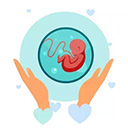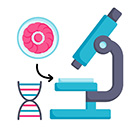
Overcoming Fallopian Tube Blockage: A Fertility Specialist’s Story
Early in my career as a fertility specialist, I met a patient named Sarah. She was 34 years old, and like many women who visit my clinic, she came with a mix of hope and frustration. Sarah and her husband had been trying to conceive for over two years, but every month ended in disappointment. After an initial evaluation, her tests revealed a blockage in both fallopian tubes. This diagnosis was heartbreaking for Sarah, but it was also the beginning of a journey toward a solution.
Fallopian tube blockage or damage is one of the most common causes of infertility. As I’ve worked with more patients over the years, I’ve learned how complex and emotionally challenging this issue can be. Let me share what I’ve discovered and how we can help women facing this condition.

Understanding Fallopian Tubes and Fertility
The fallopian tubes play a crucial role in conception. They are the pathways that connect the ovaries to the uterus, where eggs meet sperm for fertilization. When one or both tubes are blocked or damaged, the journey of the egg and sperm is disrupted, making natural conception nearly impossible.
Dr. Emily Stevens, a reproductive endocrinologist, explains,
“Fallopian tube damage doesn’t just block physical pathways; it can also impact the overall function of the reproductive system by creating inflammation or scarring.”
In Sarah’s case, an undiagnosed pelvic infection from years ago had caused scarring and blockage. Many women don’t realize how infections, surgeries, or even conditions like endometriosis can silently damage their fallopian tubes.

Common Causes of Fallopian Tube Blockage
Over the years, I’ve identified several common culprits behind tube-related infertility:
- Pelvic Inflammatory Disease (PID): Often caused by untreated sexually transmitted infections, PID can lead to scarring and blockages.
- Endometriosis: This condition can cause tissue to grow around the tubes, leading to obstructions or poor functionality.
- Previous Surgeries: Abdominal or pelvic surgeries can result in adhesions that interfere with the tubes.
- Ectopic Pregnancy: A history of ectopic pregnancies can lead to scarring or permanent damage to the tubes.
Every patient’s story is different, but the underlying cause often guides the treatment plan.

Diagnosing Blockages: The Key to Finding Solutions
Diagnosing fallopian tube issues isn’t always straightforward. For many women, the problem goes unnoticed until they try to conceive. In Sarah’s case, a specialized test called a hysterosalpingogram (HSG) revealed the blockage. This X-ray procedure involves injecting dye into the uterus and tubes to see if they’re open.
Sometimes, we use laparoscopy—a minimally invasive surgical procedure—to get a clearer picture of what’s happening. This approach not only helps with diagnosis but can also allow us to treat minor issues during the same procedure.
Treatment Options for Blocked Fallopian Tubes
When patients like Sarah ask, “What’s next?” the answer depends on the extent of the damage. Here are the main treatment options:
- Surgery: For women with minor blockages or adhesions, surgical repair can sometimes restore functionality. However, surgery isn’t always successful, especially if there’s extensive damage.
- In Vitro Fertilization (IVF): IVF bypasses the fallopian tubes entirely. Eggs are retrieved directly from the ovaries, fertilized in a lab, and implanted into the uterus. For many patients, IVF offers the best chance of conception when the tubes are beyond repair.
- Managing Underlying Conditions: Addressing issues like endometriosis or infections can improve overall fertility health and prepare the body for pregnancy.
Dr. James Carter, a leading fertility surgeon, highlights,
“Surgery can be an option for certain cases, but we always weigh the risks and success rates compared to IVF. Ultimately, our goal is to provide the best chance for a healthy pregnancy.”
The Emotional Toll of Infertility
Fallopian tube damage doesn’t just affect the body—it weighs heavily on the heart and mind. Sarah once told me, “It’s hard not to feel like my body is working against me.” Her words stuck with me, as they reflect what so many women feel: a sense of loss, frustration, and even guilt.
That’s why emotional support is just as important as medical treatment. Whether it’s counseling, support groups, or simply having someone to listen, addressing the emotional side of infertility can make a huge difference.
Sarah’s Success Story
After discussing her options, Sarah decided to pursue IVF. The journey wasn’t easy—hormone injections, egg retrieval, and waiting for results can be overwhelming—but it was worth it. A year later, she returned to my office with her newborn daughter in her arms. Her story is a testament to resilience and the power of modern fertility treatments.
Final Thoughts
As a fertility specialist, I’ve seen how fallopian tube damage can feel like an insurmountable obstacle. But with the right diagnosis, tailored treatment, and emotional support, there’s hope for almost every patient. Sarah’s story, and many like hers, remind me why I do what I do.
If you’re struggling with infertility related to fallopian tube issues, know that you’re not alone. There’s a path forward, and with the right care, your dream of parenthood can become a reality.







